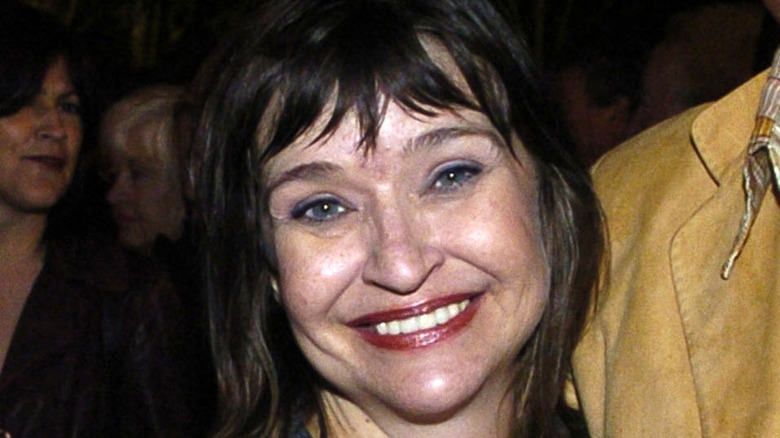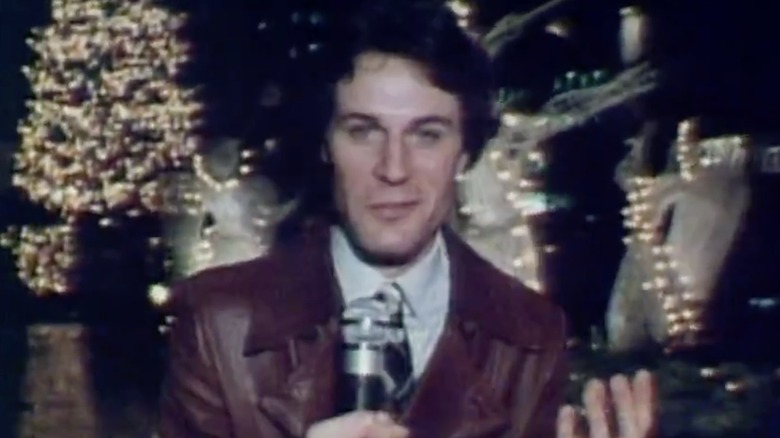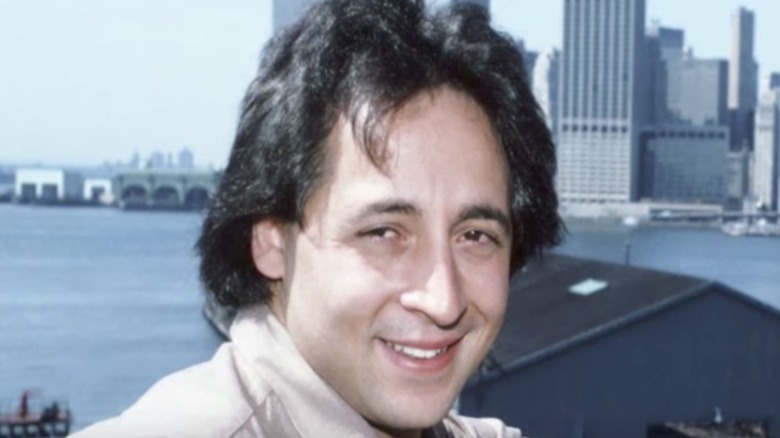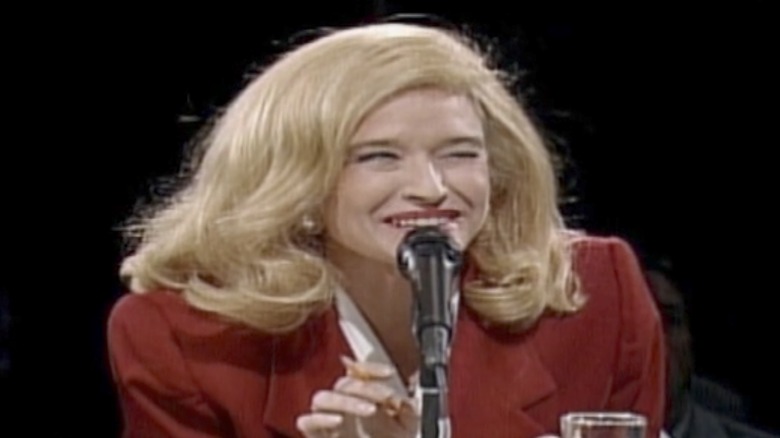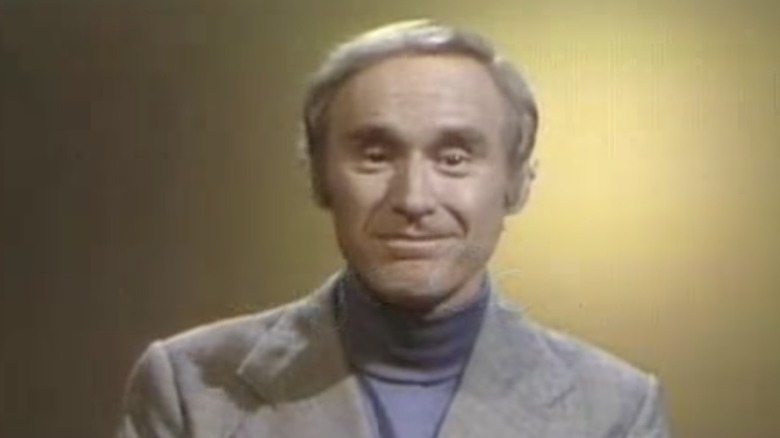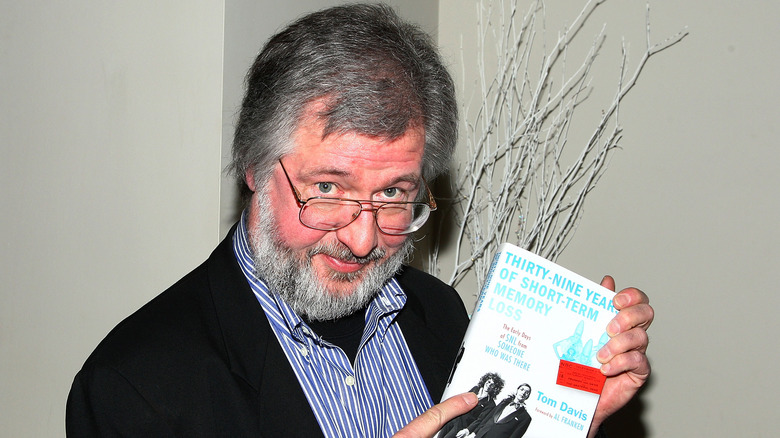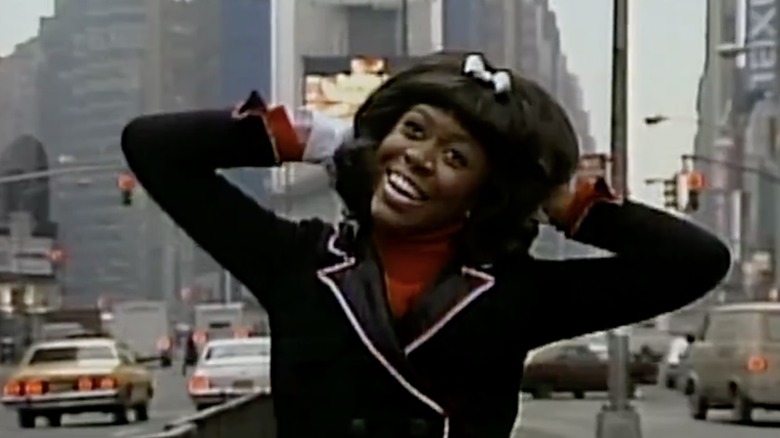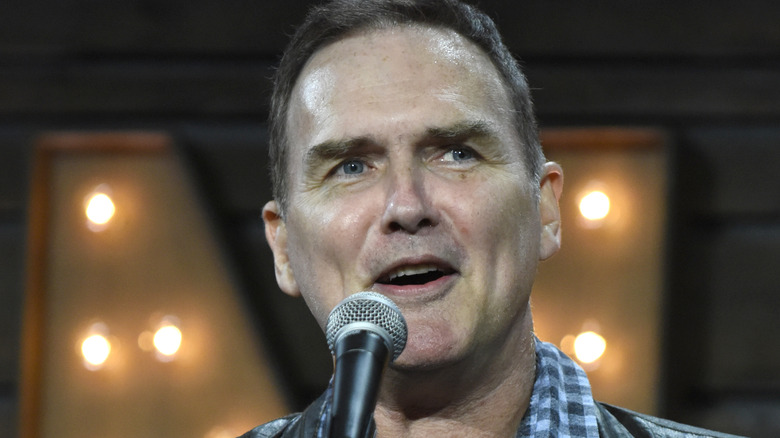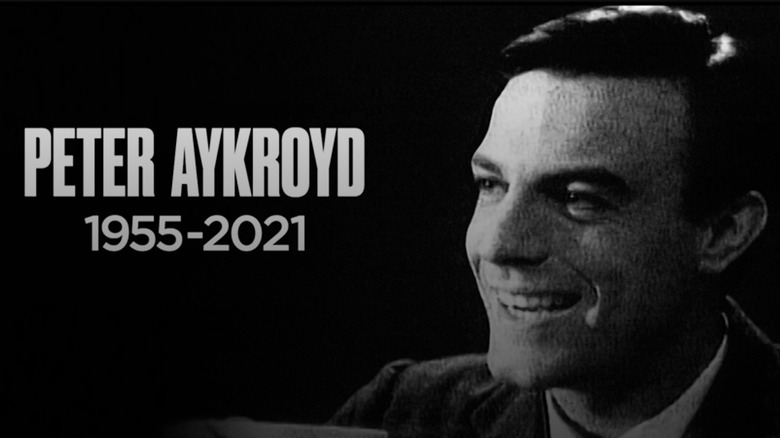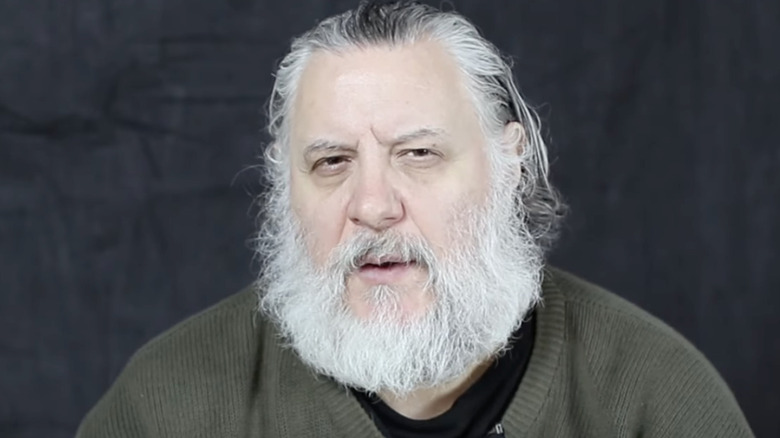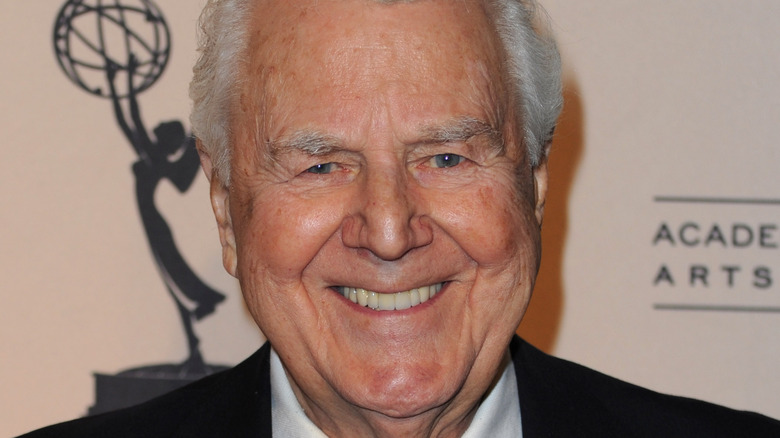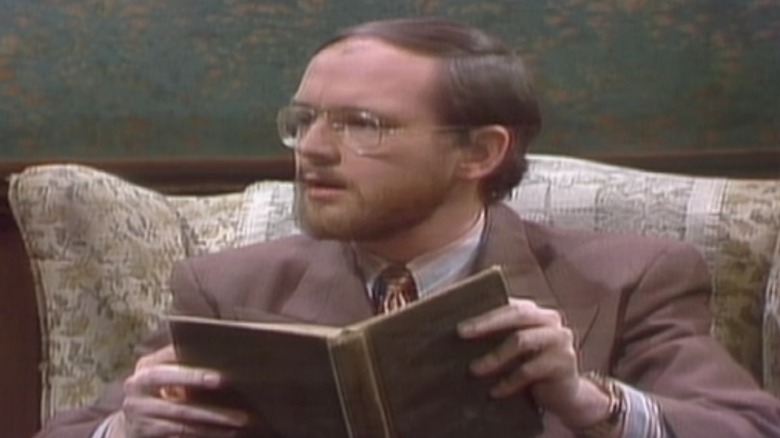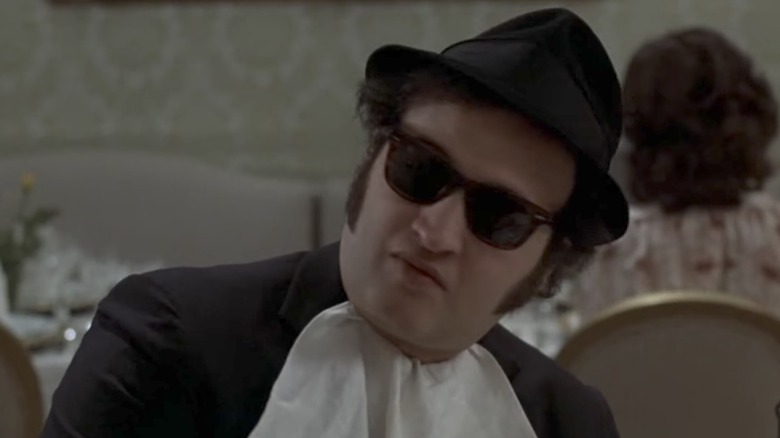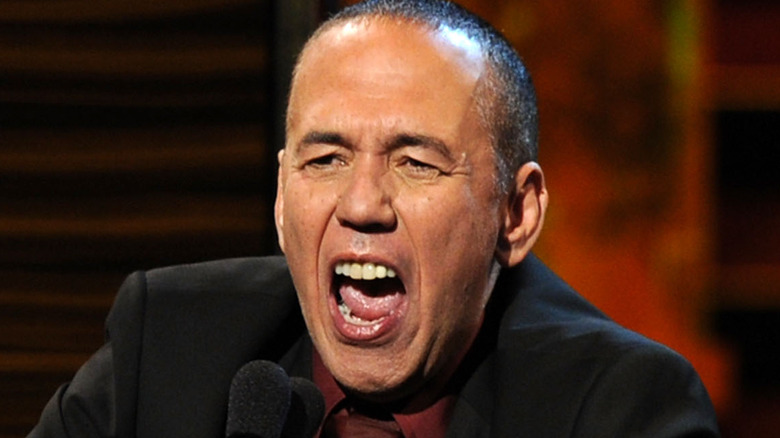SNL Cast Members You May Not Have Realized Had Died
Nearly 200 Saturday Night Live cast members have taken the stage at 30 Rockefeller Plaza over the past 40-something years, delivering satirical comedy and memorable characters. Some of those players leave the show and go on to major stardom as movie or TV stars. Others? Not so much. Maybe they enjoy smaller careers as character actors or move out of show biz completely. As such, they fade from the public eye, and the deaths of these stars of a comedy institution go largely unnoticed. Here are some "SNL" cast members whose deaths you may not have heard about.
Charles Rocket
In another time or in different circumstances, Rocket could have been a huge "SNL" star. But he joined the cast for the 1980 season — the one without Lorne Michaels, which successor Jean Doumanian mismanaged. Rocket provided some of that season's few notable moments, such as his amusing "The Rocket Report," a series of "man-on-the-street" segments. Oh, and he also said the F-word live on the air.
During the February 21, 1981, episode of "SNL," hosted by "Dallas" star Charlene Tilton, the show parodied her show's huge "Who Shot J.R.?" plot line by having an unknown gunman take a shot at Rocket. (They called it "Who Shot C.R.?" Get it?) At the end of the episode, during the part when the cast waves goodnight from the stage, Rocket sat in a wheelchair. Tilton asked Rocket how it felt to be shot, and he replied, "Ah, man. It's the first time I've ever been shot in my life. I'd like to know who f***ing did it."
Dropping the F-bomb on network TV was a huge violation of FCC rules; Rocket quickly lost his job (per EW). He went on to a decent career specializing in playing jerks, cads, and villains in comedies. He's great in "Earth Girls are Easy" and "Dumb and Dumber." Unfortunately, in 2005, the 56-year-old's body was found near his home in Connecticut, in a death the medical examiner's office ruled a suicide (per People)
If you or anyone you know is having suicidal thoughts, please call the National Suicide Prevention Lifeline at 1-800-273-TALK (8255).
Tony Rosato
In 1981, NBC fired Jean Doumanian and tasked Dick Ebersol with saving "SNL." His plan: to fire almost all of Doumanian's cast and bring in new performers. So he tried to poach people from "SNL's" competition and Canadian counterpart, "Second City Television," or "SCTV."
While Ebersol couldn't persuade Catherine O'Hara to switch teams, he did land Robin Duke and Tony Rosato, according to The New York Times. But once Rosato got to "SNL," he couldn't garner much screen time — he was physically and stylistically similar to one of the show's big stars, Joe Piscopo. While Rosato managed to get a few recurring characters on the air, like his radio show host Vic Salukin, he was fired at the end of the 1981-82 season.
Rosato worked steadily on Canadian TV (and provided the voice of Luigi on a couple of animated shows based on "Super Mario Bros."), but then mental illness took a tragic toll, according to the Toronto Star. In 2005, Rosato called the police to report that imposters had replaced his wife and baby. The cops didn't believe him, of course, and instead arrested Rosato on charges of criminal harassment, for which the comedian spent four years in custody — two in maximum security prison, and two in a psychiatric facility. About a decade after his release and rehabilitation, Rosato passed away from a heart attack at age 62 in January 2017.
Jan Hooks
In the late '80s and early '90s, "SNL" cast members called Phil Hartman "the glue," because he was a versatile utility player who kept the show together and made everything better. But who was his frequent and most memorable scene partner? The equally glue-ish Jan Hooks.
The Georgia-born actress was a scene-stealer in recurring bits like the Sweeney Sisters nightclub act and delivered pointed and fierce celebrity impressions, such as a laser-focused Hillary Clinton, a smarmy Diane Sawyer, and a phony Tammy Faye Bakker opposite Hartman's televangelist Jim Bakker.
Hooks left "SNL" for primetime in 1991, joining the cast of CBS's hit "Designing Women." She popped up on TV and in the movies, mostly in parts way too small for someone of her stature. But who else but Hooks could've played Jenna's sleazy mother on "30 Rock?" In 2014, 57-year-old Hooks died from throat cancer (per AV Club). Shortly after her death, "SNL" paid tribute with the re-airing of the poignant 1988 short film "Love is a Dream," which starred Hooks and Hartman. (The same sketch aired after Hartman died in 1998.)
George Coe
Among "Saturday Night Live's" original cast of young, relatively unknown performers — billed as the "Not Ready for Primetime Players" — was show biz veteran George Coe. He'd performed in Broadway shows and on TV and earned an Academy Award nomination for his 1968 short film "The Dove," (per Variety). Then 46-years-old, and the oldest cast member on the show by far, Coe was credited by name on only the first episode of "SNL" in 1975, but appeared in supporting roles throughout that inaugural season. After Coe left the series, he continued to rack up credits and is probably best known to modern audiences as the voice of put-upon butler Woodhouse on "Archer." He died at age 85 in 2015 — on a Saturday.
Tom Davis
As a writer for the show for nearly 30 years, off and on, Davis created (or helped create) classic bits like Bill Murray's "Nick the Lounge Singer," the Coneheads, and guest host Christopher Walken's "The Continental," according to the Hollywood Reporter. However, he also showed up on screen quite a bit in the early years of the show.
With writing partner Al Franken, he was the Davis part of the "Franken & Davis" comedy duo. Another highlight: in the sketch "Ask President Carter," the president (Dan Aykroyd) takes phone calls from Americans in need. In one, he talks down a young man from a bad acid trip: The kid freaking out was voiced by Davis. Sadly, throat and neck cancer killed Davis, or as he wryly put it, "deanimated" him, in 2012 (per The New York Times).
Danitra Vance
Danitra Vance was part of the "SNL" cast for just the 1985-1986 season, but she's in the show's history books for a few reasons. She was the first African American woman to be a full-time or "repertory" cast member, as well as the first lesbian cast member.
She also struggled with dyslexia: Writer/producer/cast member Al Franken said in "Live from New York: The Complete Uncensored History of Saturday Night" that Vance's learning disability manifested in an inability to read cue cards during live broadcasts. However, Vance had a background in theater and performance art, which gave her the tools to ad-lib her way through sketches. A lot of her stuff on "SNL" was solo, theater-ish stuff, like "Shakespeare in the Slums" and her role as teenage mother Cabrini Green Harlem Watts Jackson. Just a few years after her brief stint on "SNL," Vance was diagnosed with breast cancer. Despite a mastectomy, Vance passed away on August 21, 1994.
Norm Macdonald
First and foremost a stand-up comic, Norm Macdonald brought his unique comedy stylings to "Saturday Night Live" as a writer in 1993, ultimately joining the cast for the occasional sketch and as the anchor of "Weekend Update." Macdonald, whose delivery was always arch, ironic, laconic, and blunt, introduced the segment for what it was, "the fake news," before delving into weird, irony-drenched, out-of-nowhere jokes about sex workers and O.J. Simpson's murder trial.
His constant, darkly funny proclamations that the ex-football star was truly guilty of the crimes for which he was acquitted actually led to Macdonald's dismissal from the show. Don Ohlmeyer, an "SNL" executive and friend of Simpson, ordered the comedian's removal, according to The Hollywood Reporter. After "SNL," Macdonald returned to stand-up comedy and also starred in a few short-lived sitcoms like "Norm" and "The Norm Show."
Macdonald didn't publicly disclose he'd received a cancer diagnosis in 2013. Nine years later, in September 2021, he died from the disease, according to Deadline. The comedian was 61-years-old.
Peter Aykroyd
After Dan Aykroyd left "SNL" in 1979, the show brought in his brother, Peter Aykroyd. He spent the 1979-1980 season at "SNL" as an actor and staff writer, according to Variety. His most well-received work on "SNL" was likely "Java Junkie," a short film in which Aykroyd starred as a jittery coffee enthusiast. In the '90s, he co-created "PSI Factor," a syndicated paranormal series hosted by his brother, with whom he also wrote the 1991 comedy "Nothing But Trouble." Aykroyd also had small roles in his brother's movies "Coneheads" and "Spies Like Us."
Aykroyd's death was publicly disclosed via a tribute on "SNL." The November 21, 2021 episode featured a re-airing of a "Java Junkie," along with a still listing Aykroyd's name, birth date, and death date. Dan Aykroyd later told USA Today via his publicist that his sibling died from sepsis after suffering an untreated hernia. Aykroyd was 66.
Dan Vitale
"Saturday Night Live" creator Lorne Michaels left the show for a few years in the 1980s, during which time he created the short-lived sketch comedy series "The New Show" for NBC. When that show ended in 1984, Michael returned to "SNL" and brought comedian Dan Vitale with him.
According to Vulture, Vitale only appeared in a handful of sketches in a few episodes of "SNL" during the 1985-86 season, including a scene opposite guest host Madonna (playing her cousin at her wedding, flirting with Cyndi Lauper) and in one of Jon Lovitz's first "Pathological Liar" sketches. Vitale left "SNL" midway through the season to seek treatment for substance abuse issues and never came back. He returned to comedy and landed small roles in the movies "Anger Management" and "Malibu's Most Wanted."
According to PopCulture, friends of Vitale disclosed the news of the comedian's death on May 6, 2022. He was 66.
Don Pardo
While Don Pardo appeared on-screen on "Saturday Night Live" only rarely (per The Hollywood Reporter), he was an iconic figure on the show as one of it's most venerable staffers. Pardo served as the "SNL" announcer, excitedly naming off the cast members at the beginning of each live show, and later announcing the next episode's guest host and musical act. He also played announcers in sketches, when scripts called for that.
Pardo was the in-house "SNL" announcer for 38 seasons, from its debut in 1975 until 2014 — he sat out one season and a few episodes here and there due to illness and injury. He was set to retire in 2004 until he learned he had a lifetime contract with NBC, where he'd worked for 31 years already before "SNL" even started. Some of Pardo's other notable announcing work involved the original "Jeopardy," the Macy's Thanksgiving Day Parade broadcasts, and historic news — in 1963, he broke the news that President John F. Kennedy had been shot.
On August 18, 2014, a spokesperson for NBC told The Hollywood Reporter that Pardo had died in his sleep while at his Tucson, Arizona, home. The "Saturday Night Live" announcer was 96.
Michael O'Donoghue
"SNL's" occasional bursts of edgy darkness are the legacy of its first head writer — and occasional performer — Michael O'Donoghue. O'Donoghue appeared in the very first sketch on the very first episode of "SNL," in which he portrayed an English teacher who makes his student (John Belushi) repeat nonsensical phrases. When O'Donoghue's character keels over from a heart attack, the student dutifully copies. He also played "Mr. Mike" (a vaguely unsettling figure who read inappropriate children's stories like "The Little Train That Died"), and a nightclub performer who did impressions of what cheesy celebrities (like Tony Orlando and Mike Douglas) would sound like if they shoved needles into their eyes.
O'Donoghue was an incredibly influential voice in comedy during his time on "SNL," but he didn't stop when he left the show. He worked on cult classics, including co-writing "Scrooged" and co-writing and directing "Mr. Mike's Mondo Video," to cite two examples. In 1994, O'Donoghue died of a cerebral hemorrhage at age 54, according to The New York Times.
Now that we've covered all the "SNL" stars whose deaths slipped by you (and made you sad), here are some "SNL" legends whose tragic deaths dominated the headlines (and made you sad).
Gilda Radner
Gilda Radner was a frenetic force of nature who played a wide and wild variety of characters on "SNL" in the '70s, including nerdy Lisa Loopner, a kooky Barbara Walters derivative named "Baba Wawa," and abrasive "Weekend Update" contributor Roseanne Roseannadanna. Radner departed "SNL" in 1980, the same year that a filmed version of her Broadway show "Gilda Live" hit movie theaters.
Radner never really got a chance to pursue the big-screen success that seemed inevitable. Aside from appearing in a couple of forgettable movies like "Haunted Honeymoon" and "The Woman in Red" (both with husband Gene Wilder), Radner spent most of the '80s fighting ovarian cancer, according to People. Wilder told the magazine that Radner would direct her Roseanne Roseannadanna character at the cancer cells, quipping, "Hey, what are you trying to do here? Make me sick?"
Alas, Radner succumbed to the disease in May 1989 (per the LA Times). Just a few hours after Radner died, "SNL" aired its Season 14 finale, hosted by Steve Martin, a frequent guest on the show back in Radner's era. Instead of a monologue, Martin addressed the news with a replay of "Dancing in the Dark," a sweet sketch from 1978 where he and Radner danced all over the "SNL" stage.
John Belushi
Belushi was the first member of the original "SNL" cast to pass away. His highlight reel is a highlight reel of the first few years of "SNL" itself. During his time on the show, he played a samurai trying out unlikely professions, a world-class athlete fueled by "Little Chocolate Donuts," a Greek diner worker ("Cheeseburger! Cheeseburger!"), a singing bee, Beethoven, a Joe Cocker dead ringer, a Blues Brother, and so many others.
Belushi also starred in the show's short film "Don't Look Back in Anger" (sad, in retrospect). Set in the distant future, an elderly makeup-wearing Belushi visited the graves of his "SNL" costars, bragging he outlived them all because he's "a dancer!" That's the only old Belushi the world got to see — the comedian had major substance abuse problems, and the 33-year-old "Animal House" star was found dead in his bungalow at Hollywood's Chateau Marmont in 1983 (per The New York Times). Cause of death: a drug overdose, per The Hollywood Reporter.
If you or anyone you know needs help with addiction issues, help is available. Visit the Substance Abuse and Mental Health Services Administration website or contact SAMHSA's National Helpline at 1-800-662-HELP (4357).
Chris Farley
Farley's life — and death — mirrored that of his idol, John Belushi (per NY Daily News). Both came up in the Chicago comedy scene, both dominated "SNL," and both died at age 33. Among Farley's greatest characters: pathetic motivational speaker Matt Foley (he lived in a van down by the river), star-struck host of "The Chris Farley Show," and a would-be Chippendale's dancer. After moving on from "SNL" in 1995, Farley's movie career took off with roles in "Billy Madison," "Tommy Boy," and "Black Sheep." Through it all, Farley struggled with his demons — he tried very hard to get sober, reportedly enrolling in rehab programs 17 times, according to EW. Just a few weeks after hosting "SNL" in October 1997, the comic dynamo fatally overdosed (per The New York Times).
If you or anyone you know needs help with addiction issues, help is available. Visit the Substance Abuse and Mental Health Services Administration website or contact SAMHSA's National Helpline at 1-800-662-HELP (4357).
Phil Hartman
Hartman was a crucial cast member on what are likely the two most important comedy shows ever: "The Simpsons" and "Saturday Night Live." He voiced Troy McClure and Lionel Hutz on the former and played more characters than we can count on the latter. Some favorites: Unfrozen Caveman Lawyer, the Anal-Retentive Chef, Frankenstein's monster, a verbally abusive Frank Sinatra, a secretly conniving President Reagan, and a smug Bill Clinton.
Unsurprisingly, other cast members adored Hartman. In "Live from New York," Mike Myers called Hartman "one of the best character-based comedians ever" and said he was "extremely supportive and hilarious. He never gave up on a sketch and his work ethic was amazing." Hartman was clearly a nice guy, and audiences could surely tell, even when he played narcissistic jerks like Bill McNeal on "NewsRadio," his "SNL" follow-up series.
That's just a small part of why Hartman's death was so shocking and sad. In May 1998, Hartman's wife, Brynn, struggling with mental health issues, shot Hartman before turning the gun on herself, according to Salon. The "SNL" legend was just 49.
If you or anyone you know is having suicidal thoughts, please call the National Suicide Prevention Lifeline by dialing 988 or by calling 1-800-273-TALK (8255).
Gilbert Gottfried
Stand-up comic Gilbert Gottfried joined the cast of "Saturday Night Live" in 1980 as part of a full cast overhaul, impressing producers with an audition full of the comic shouting and wild behavior, according to "Saturday Night: A Backstage History of Saturday Night Live." The style would ultimately inform his squinting, gratingly voiced schtick in "Problem Child," "Aladdin," and AFLAC commercials (as the talking duck), per IMDB.
Gottfried got his break on "SNL," where he played a variety of uniquely voiced characters during the 1980-1981 season, including "What's It All About" host Leo Waxman and director Roman Polanski. In addition to his acting career, where he more or less played the same character, Gottfried took his show on the road and became a heavily touring comedian.
Gottfried's own Twitter account reported on August 12, 2022, that the comedian had died following a "long illness." His publicist later explained (via People) that Gottfried died from heart problems due to a genetic muscular disease. He was 67-years-old.
